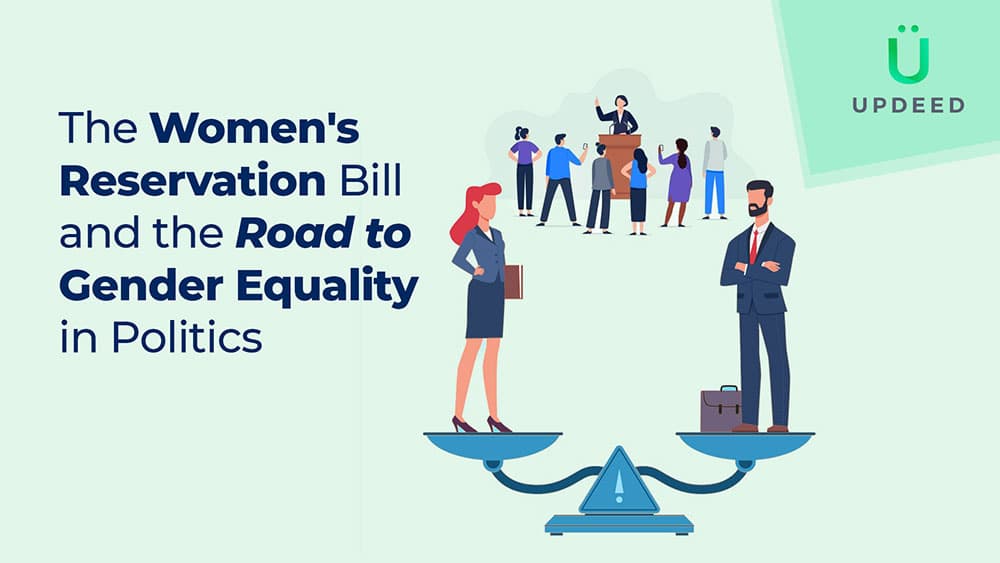The Women’s Reservation Bill and the Road to Gender Equality in Politics
After twenty-seven years of relentless debate and advocacy, the Lok Sabha’s near-unanimous passage of a bill to amend the Constitution and provide one-third reservation to women in the Lok Sabha and State Assemblies is nothing short of a watershed moment in the journey towards women’s empowerment in India.
Why is this necessary, you may ask?
The answer lies in the undeniable and persistent gender disparities that have plagued our political landscape for far too long. Women make up nearly half of India’s population, yet their representation in our legislative bodies has remained abysmally low.ย

This underrepresentation not only denies women a rightful place in decision-making but also perpetuates a cycle of inequality that seeps into every aspect of their lives. It is essential to acknowledge that women’s voices, perspectives, and experiences are equally valid and vital for a thriving democracy.
A step towards transformation
This historic step towards women’s empowerment can bring about transformative changes.
Firstly, it sends a powerful message that gender should not be a barrier to political leadership. When women see other women in positions of power, it inspires them to aspire to such roles, challenging traditional gender norms and encouraging girls to dream big. Representation matters, and this bill paves the way for more young girls to envision a future in politics.
Moreover, increased female representation in legislative bodies promises policies that address issues disproportionately affecting women. Women-centric concerns such as healthcare, education, safety, and economic empowerment will likely receive more attention. This, in turn, can lead to improved legislation that caters to the diverse needs of our society.
However, while the passage of the Women’s Reservation Bill is a significant milestone, it is not the end of the road. There is more work to be done to ensure a better future for women in politics.
Promoting women’s participation in grassroots politics: Reservation in higher legislative bodies is crucial, but we must also encourage women’s involvement in local governance, panchayats, and municipal bodies. Strengthening their presence at the grassroots level will provide a solid foundation for future leaders.
Breaking the Glass Ceiling in Political Parties: Political parties need to adopt internal policies that promote women’s leadership and participation. This includes nominating women as candidates in elections and offering them leadership roles within the parties themselves.
Ensuring equal access to resources: Women often face barriers when it comes to campaign financing and resources. Measures must be put in place to ensure that female candidates have equal access to funds and support, leveling the playing field.
Fostering inclusive political cultures: Creating a political culture that is free from discrimination, harassment, and gender bias is essential. Parties and institutions must adopt stringent anti-harassment policies and promote an inclusive environment where women feel empowered to voice their opinions.
Engaging men as allies: Achieving gender equality in politics is a collective effort. Engaging men as allies in this endeavor is crucial. Men can play an active role in advocating for gender-balanced policies and supporting women in their political journeys.
Monitoring and evaluation: We must continually monitor the impact of the Women’s Reservation Bill and related policies to assess their effectiveness. Adjustments may be necessary to ensure that the intended goals are met.
Address broader issues
Additionally, we must address the broader issues of gender equality, including increasing women’s political and civic participation beyond reservations.
This requires tackling deep-rooted societal biases, providing better support and resources for women in politics, and fostering a culture of inclusivity and respect within our political parties.
In conclusion, the passage of the Women’s Reservation Bill marks a significant stride towards women’s empowerment in India.
It is a testament to the persistent efforts of activists, lawmakers, and advocates who have long championed this cause. While this development is laudable, our journey towards a more equitable future is far from over.
It is imperative that we continue our efforts to ensure that women’s voices are not just heard but also valued in shaping the destiny of our great nation.
Ready to make a positive impact in the world?
UPDEED is the place for you. Our free and open platform is filled with inspiring stories from individuals and organizations who are making a difference in their communities and beyond. Connect and collaborate with like-minded individuals from around the globe on UPDEED, and discover your own potential to create meaningful change. Join our community and make a difference.





